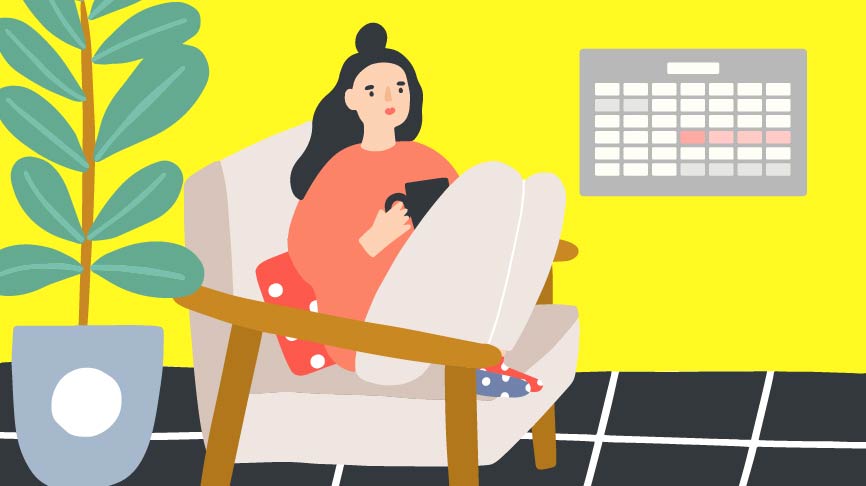COVID-19 and Your Period: Sickness, Stress & Shopping for Menstrual Products

This article was medically fact-checked by Consultant Obstetrician and Gynaecologist Dr. Shree Datta.
As if you didn’t have enough freak-out material for your anxiety-ridden brain to process during the corona crisis, now your period is acting up, or, seemingly worse, it’s coming right on time and you’re out of tampons.
Before you frantically call up the nearest, overworked nurse practitioner or start planning for the bloodiest mess your bathroom has ever seen, make sure your whacked-out cycle isn’t experiencing it’s own (temporary) crisis.
A lot can happen to your period when you’re stressed or sick, and sometimes menstruation can cause weird, illness-like symptoms all it’s own. We’ve got the facts on what’s going down between your legs (and between your ears) during COVID-19 and how to sanely manage your period woes while staying safer at home.
First Thing’s First – Don’t Panic Over Tampons and Pads
We’ve been singing the praises of reusable period products since day one. We are a menstrual cup company, after all!
But seriously, when has there ever been a better time to finally test out a body-safe, silicone period cup? If you can’t leave the house on the regular to re-up on tampons and pads, how can you be expected to manage your period?
In light of the corona craziness – and obvious difficulties in reaching a grocery store on the regular – we’ve discounted our entire collection of reusable menstrual cups. Click here to check out the sale, and then keep reading.
If you haven’t been keeping up with everything period-related at INTIMINA, we’ll fill you in real quick. In short, a menstrual cup is a small, flexible piece of medical-grade silicone shaped into a cup that’s tiny enough to double as a water dish for a hummingbird. Whenever you’re bleeding, simply squeeze the cup, gently insert it into your vagina (with a little help from some lube if necessary) and you can leave it in place for up to 8 hours.
No matter the strength or stretch of your vagina, there’s a cup made to fit your body, and all the cups in our collection can handle even your heaviest days without leaking.
While you’re stuck on lockdown, the awesome folks at INTIMINA headquarters will ship a cup straight to your doorstep. In the lonesome freedom of your home, get to know your new favorite period routine. Practice inserting it and removing it. Pretend you’re in a public bathroom and find the most comfortable position and routine for managing your cup while out.
We promise this will be the best takeaway from all that time indoors.
While you await your new cup’s arrival, read up on how to care for and clean this amazing little piece of silicone.
Stress & Illness = Menstrual Cycle Disruptions
Even if you’re already set up for a manageable menstrual cycle, your period might be in a quarantine of its own.
According to the MD team at MedicalNet, it’s easy to make the connection between COVID-19 and unexplained period oddities. Stress is one of the most common causes of late or missed periods.
Even if you haven’t caught the coronavirus or another seasonal illness, the hormones at play while you’re feeling anxious and nervous, depressed or over-stressed can still wreak havoc on your body.
In a medically-reviewed article on stress and menstruation, we learn a less-than-encouraging fact: the relationship between period irregularity and stress isn’t well known, even in the medical community.
However, doctors do know that stress suppresses the function of the hypothalamus in the brain, which controls the pituitary gland – the organ in charge of your ovaries, thyroid and adrenal glands. Together, those body parts are supposed to work to maintain your hormone production levels – at least until stress comes stomping through.
The same thing happens when you’re sick. Colds, fevers and the flu disrupt the way your body normally functions and are well-known for causing missed or irregular periods for up to a month.
If your period is late, heavier or lighter than usual, or just plain off while stuck inside and you’ve got no reason to suspect it could be pregnancy, stress or illness may likely be playing a part. However if this keeps happening, be sure to pay your Gynecologist a visit.
While we know you’re limited on remedy options right now, the medical experts at Healthline have a handful of recommendations that are still functional from within your home.
Practicing yoga and meditation; mindful deep breathing in front of your favorite candles; listening to soothing music in a comfortable spot; reducing your daily caffeine intake; and – our favorite – calling up your friends and family for a good laugh from afar – all these simple practices can help return your body and mind to a more calm state.
Put down the smartphone, stop checking the news more than twice a day, and you’ll ride this out, weird period or not.
Is it COVID-19 or just PMS?
You’re nauseous, experiencing constipation, diarrhea or another digestion-related discomfort, and topping it all off with chills, a fever and muscle cramps. Understandably, you’re now terrified. These are the same symptoms associated with the onset of the coronavirus.
While we absolutely recommend calling up a local health clinic and seeking a COVID test if that’s the case, take a peek at your calendar before assuming the worst. Is your period on the horizon? If so, you might be experiencing PMS. Regardless, seek proactive advice if COVID is suspected, self isolate and get tested if possible.
The medical menstrual experts at HealthLine explain that cycle-related chemical changes in the body can cook up a perfect storm of estrogen, serotonin, and prostaglandin. These respective hormones, brain chemicals and hormone-like fatty acids are essentially triggering an insane version of PMS. Remember, if these are the same symptoms that are appearing every month, then that can be a good indication of the difference.
PMS can range from annoying to awful, with symptoms like cramps, moodiness and bloating. Your head may pound, your stomach may ache, and your temperature may rise. All of these symptoms can be exacerbated by feelings of anxiety.
Regardless of where you are in your cycle, if you exhibit any symptoms of COVID-19 including fever, cough, or feeling unwell, and you have any reason to believe you could have been exposed to it, please call a doctor, explain your symptoms and learn your virus testing options.
But don’t be surprised if it’s just the ol’ monthly flow taking your already stressed-out brain and body for a ride (and phew! on that).
Facts checked by:
Dr. Shree Datta
Dr. Shree Datta is a Consultant Obstetrician and Gynaecologist in London, specialising in women’s health including all menstrual problems such as fibroids and endometriosis. Dr. Shree is a keen advocate for patient choice, having written numerous articles and books to promote patient and clinician information. Her vision resonates with INTIMINA, with the common goals of demystifying periods and delivering the best possible care to her patients
Written by:

A collective group of “lady experts” at Intimina who love sharing our personal experiences, even when they are a little too personal. We believe it’s time to start breaking down the taboos around menstruation, motherhood, and menopause, and start owning our female health.




thank you for this one. lot of help. wooo!